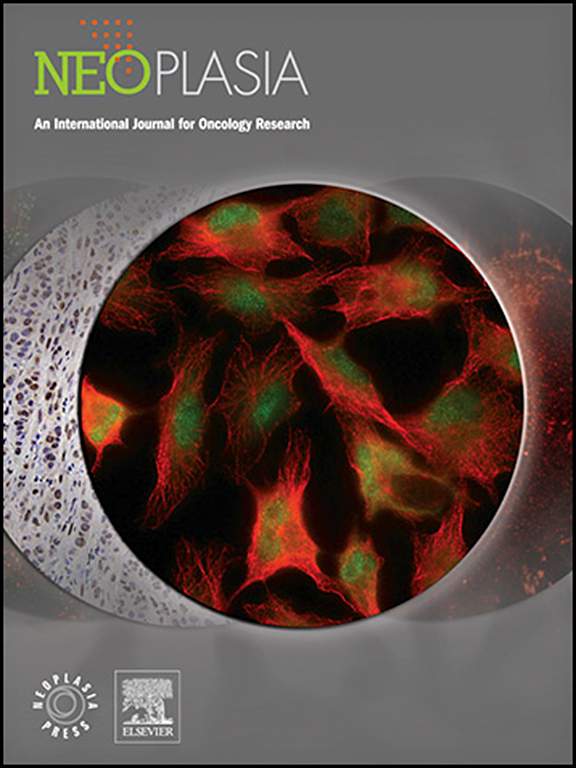抑制HnRNP l介导的EIF4G1选择性剪接可抵消去势抵抗性前列腺癌的免疫检查点阻断抵抗。
IF 4.8
2区 医学
Q1 Biochemistry, Genetics and Molecular Biology
引用次数: 0
摘要
免疫疗法与检查点抑制剂产生显著的临床反应在癌症患者的亚群谁是耐药先前的治疗。然而,去势抵抗性前列腺癌(CRPC)严重缺乏T细胞浸润,极大地限制了免疫治疗的临床应用,但其机制尚不清楚。在本研究中,计算机分析和实验数据表明,HnRNP L与患者CD4+和CD8+ T细胞浸润呈显著负相关;此外,我们发现HnRNP L的缺乏会增加CD4+和CD8+ T细胞的浸润,并损害肿瘤的发生。机制上,HnRNP L增强c-Myc的翻译,然后通过EIF4G1的选择性剪接促进CXCL8的分泌。在体内,抑制剂SBI-0640756对EIF4G1的抑制作用减弱了HnRNP l诱导的肿瘤进展和免疫抑制活性。最重要的是,HnRNP L敲低和Anti-PD-1之间的治疗协同作用可以显著抑制异种移植前列腺癌的生长。综上所述,本研究揭示了HnRNP L调控免疫浸润的分子机制,为克服CRPC免疫治疗的局限性提供了新的理论依据。本文章由计算机程序翻译,如有差异,请以英文原文为准。
Inhibiting HnRNP L-mediated alternative splicing of EIF4G1 counteracts immune checkpoint blockade resistance in Castration-resistant prostate Cancer
Immunotherapy with checkpoint inhibitors produced significant clinical responses in a subset of cancer patients who were resistant to prior therapies. However, Castration-resistant prostate cancer (CRPC) is seriously lack of T cell infiltration, which greatly limits the clinical application of immunotherapy, but the mechanism is unclear. In the present study, in silico analyses and experimental data show that HnRNP L was significantly negatively correlated with CD4+ and CD8+ T cells infiltration in patients; besides, we found deficiency of HnRNP L recruites CD4+ and CD8+ T cells infiltration and impairs tumorigenesis. Mechanically, HnRNP L enhanced the translation of c-Myc and then promoted CXCL8 secretion via alternative splicing of EIF4G1. In vivo, inhibition of EIF4G1 by the inhibitor, SBI-0640756, attenuated HnRNP l-induced tumor progression and immunosuppressive activity. And most of all, therapeutic synergy between HnRNP L knockdown and Anti-PD-1 could significantly suppress xenograft prostate cancer growth. In summary, this study revealled the molecular mechanism of HnRNP L regulating the immune infiltration, which provides a new theoretical basis for overcoming the limitation of immunotherapy for CRPC.
求助全文
通过发布文献求助,成功后即可免费获取论文全文。
去求助
来源期刊

Neoplasia
医学-肿瘤学
CiteScore
9.20
自引率
2.10%
发文量
82
审稿时长
26 days
期刊介绍:
Neoplasia publishes the results of novel investigations in all areas of oncology research. The title Neoplasia was chosen to convey the journal’s breadth, which encompasses the traditional disciplines of cancer research as well as emerging fields and interdisciplinary investigations. Neoplasia is interested in studies describing new molecular and genetic findings relating to the neoplastic phenotype and in laboratory and clinical studies demonstrating creative applications of advances in the basic sciences to risk assessment, prognostic indications, detection, diagnosis, and treatment. In addition to regular Research Reports, Neoplasia also publishes Reviews and Meeting Reports. Neoplasia is committed to ensuring a thorough, fair, and rapid review and publication schedule to further its mission of serving both the scientific and clinical communities by disseminating important data and ideas in cancer research.
 求助内容:
求助内容: 应助结果提醒方式:
应助结果提醒方式:


